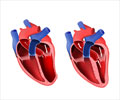
The researchers said that this burst was essential in order to meet the increased circulatory demand on the heart during preadolescence, during which the heart increases almost four-fold in size. The study has been published in the journal Cell.
“Heart muscle cells retain the ability to divide and make new cells for a long time after birth, at least until preadolescence, equivalent to eight to ten years of age in humans. The implications of our findings could be huge, as it may give us a significant window of opportunity in which to repair the hearts of babies born with heart defects, or even to reactivate heart muscle cells damaged after a heart attack in adults”, Graham said.
Source-Medindia














